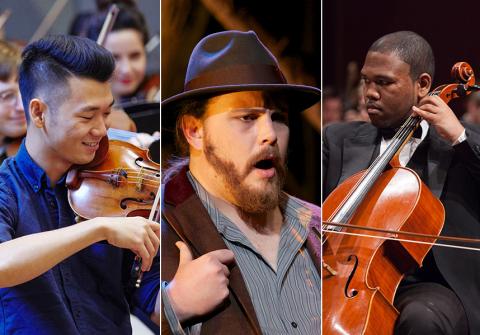Three Boston Conservatory Alumni Land Prestigious Tanglewood Fellowship for Summer 2017

Boston Conservatory at Berklee alumni Weiqiao Wu (B.M. '15, G.P.D. '17, violin), Ryne Cherry (M.M. '14, P.S.C. '15, opera), and Nathaniel Pasague Taylor (B.M. '15, G.P.D. '17, cello) are spending the summer at the Tanglewood Music Center Fellowship Program, a highly coveted academy for advanced musicians.
Performing with the prestigious Boston Symphony Orchestra (BSO) at its idyllic Tanglewood summer home in the Berkshires is a dream for any classical musician. For three Boston Conservatory at Berklee alumni who have been named 2017 Tanglewood Music Center Fellows, that dream is a reality.
As Tanglewood fellows, Ryne Cherry (M.M. '14, P.S.C. '15, opera), Nathaniel Pasague Taylor (B.M. '15, G.P.D. '17, cello), and Weiqiao Wu (B.M. '15, G.P.D. '17, violin) will spend two months this summer focused on performances—many, many performances—while working with some of the most illustrious musicians in the world. From BSO conductor Andris Nelsons to renowned soprano Dawn Upshaw to numerous guest conductors, instrumentalists, and singers, the fellows will meet, learn from, and play with the best of the best.
Founded in 1940 by then BSO conductor Serge Koussevitzky, the Tanglewood Music Center was designed to help young, advanced musicians sharpen their skills and reach their professional goals by working closely with members of the renowned orchestra. The fellows will be full participants in this summer’s Tanglewood season, and will perform alongside BSO members and guest soloists. The three Boston Conservatory musicians are thrilled by the opportunity to work with Nelsons and other conductors, including Charles Dutoit and Thomas Adès, trumpet soloist Hakan Hardenberger, cellist Astrid Schween, and esteemed musicians and vocalists. Performances will range from chamber music to full orchestra to vocal music.
Wu and others acknowledge the daunting amount of repertoire they had to learn in preparation for the fellowship. “It probably is a year’s worth or more of music in two months,” the violinist says, who will give 12 or 13 performances over the summer.
Cherry, Taylor, and Wu auditioned in the winter, and were chosen along with more than 100 other fellows to participate in the program. Taylor recalls auditioning in February following a weekend of hosting family, who had flown in from all over the world for his solo performance with the Boston Conservatory Orchestra at Sanders Theatre. With little time to practice, Taylor was “super nervous” about the Tanglewood audition, and both thrilled and amazed that he was among those selected. The cellist, who prefers to memorize all of his music, says learning the 150 pages of music before the fellowship program started was intimidating. “All of it was new to me and all very difficult,” he recalls.
For Cherry, a baritone, 2017 marks his second season as a Tanglewood fellow. Although he faces challenges, such as learning a Spanish song cycle in two dialects and learning Hungarian for a piece by a Hungarian composer, Cherry is looking forward to experimenting with a range of singing. A trained opera singer, Tanglewood has broadened his experience in chamber and early music.
Fully aware that a Tanglewood fellowship can be a stepping-stone to a career, for these alumni, the challenges are far outweighed by the opportunities to meet and learn from top conductors, soloists, and composers. As Rhonda Rider, chair of strings at Boston Conservatory, says, “There is nothing like being immersed in that culture, hearing and working with world-class artists.”
Wu, who is from northern China, views the fellowship as a pivotal experience in his “transition from a student to a professional.” Taylor notes that many professional musicians—current and past—were Tanglewood fellows, some having joined renowned orchestras soon after their fellowships. “I know being a Tanglewood fellow opens a lot of doors,” he says, adding that networking and working with BSO members is invaluable to young musicians.
The Tanglewood community also benefits, says Michael Nock, associate director for student affairs for the Tanglewood Music Center. “They bring the energy of youth,” he says, “a big ball of musical energy that feeds off itself.”
Boston Conservatory has had a long history with the BSO and Tanglewood, dating from the very beginning of the orchestra in 1881. Recently retired Boston Conservatory President Richard Ortner was a Tanglewood Music Center administrator for more than 20 years, and many Boston Conservatory faculty and alumni have been BSO musicians and administrators.
